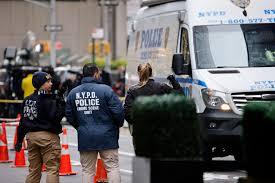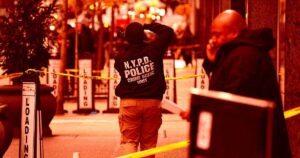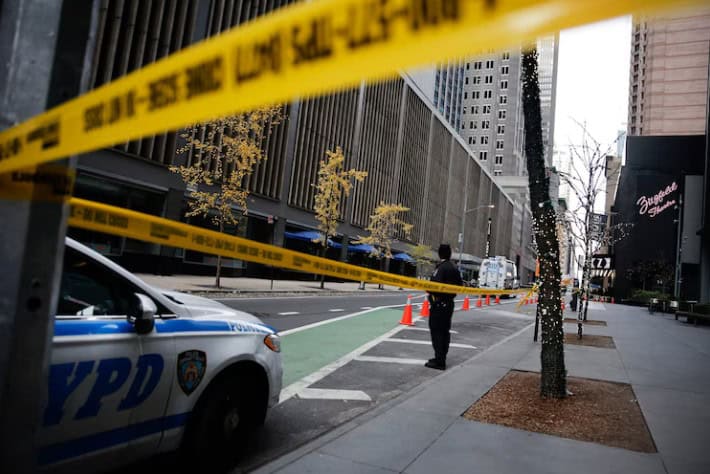In the wake of the shocking killing of UnitedHealthcare CEO Brian Thompson, the New York Police Department has issued a bulletin warning of an alarming rise in threats against health insurance executives. The bulletin, released Tuesday, underscores the potential for violence fueled by social media outrage and extreme grievances against corporate figures in the healthcare industry.
The warning paints a grim picture of an increasingly dangerous environment for corporate leaders, particularly in the health insurance sector. Viral social media posts have surfaced, listing the names and salaries of high-profile executives, while “Wanted” posters with provocative messaging have appeared throughout Manhattan. These posters, bearing images of health insurance CEOs alongside bullet-shaped graphics, send a chilling message: “Wall Street CEOs Should Not Feel Safe. Deny, Defend, Depose.”
Thompson’s Killing and Its Fallout
The assassination of Brian Thompson has sent shockwaves through corporate circles and ignited fiery debates online. Thompson was gunned down in what law enforcement officials have described as a targeted attack. Luigi Mangione, the suspect in the shooting, was arrested in Pennsylvania on Monday and now faces multiple charges in New York, including second-degree murder.
Even as Mangione awaits trial, his actions have sparked a troubling wave of admiration among online extremists. The NYPD bulletin revealed that Mangione is being celebrated as a “martyr” by some, with his violent act seen as a rallying cry for individuals harboring grievances against corporate America.
The bulletin warned that such perceptions “have the capability to inspire a variety of extremists and grievance-driven malicious actors to violence,” urging corporations to enhance security measures for their executives.
Viral Threats and Hit Lists

The bulletin pointed to the proliferation of viral social media posts targeting health insurance CEOs. One post, which prominently displayed the names and salaries of eight industry leaders, has been widely shared, with some users labeling it a “hit list” and calling for these executives to fear for their safety.
“UnitedHealthcare killed everyday people for the sake of profit. As a result, Brian Thompson was denied his claim to life. Who will be denied next?” read one of the provocative posters seen in Manhattan. The messaging tapped into a growing undercurrent of public frustration with the healthcare industry, which many blame for prioritizing profits over lives.
The rhetoric online has been equally incendiary. The NYPD highlighted multiple posts where users expressed approval of Thompson’s murder, blaming his death on the insurance industry’s alleged role in denying medical care to patients. One post read, “My mom was denied chemo multiple times and suffered tremendously… She will have life-altering damage because of it. F*** him, may he rest in piss.”
Another user shared a broader sentiment of distrust and anger toward corporate leadership and government, writing, “The politicians are compromised, and the corporations are suffocating us—all CEOs should be considered. Sucks when your government is bought by these CEOs who immediately impact the masses.”
A Climate of Escalating Hostility
The NYPD has raised concerns that the intense public reaction to Thompson’s death could create fertile ground for further violence. The bulletin urged companies to take the threats seriously and to bolster security around their executives.
“These developments highlight a growing risk environment where individuals driven by grievances or extremist ideologies may seek to emulate Mangione’s actions,” the report stated. It added that corporations should consider precautionary measures such as surveillance, increased executive protection, and online monitoring of potential threats.
The bulletin also noted that the imagery and rhetoric in these threats are designed to inflame public emotions. The “Wanted” posters plastered across Manhattan depicted corporate leaders as villains responsible for systemic failures, casting them as legitimate targets for retribution. These messages are amplified online, gaining traction among communities already primed by distrust and frustration with the healthcare system.
A Broader Debate on Healthcare and Corporate Accountability

Thompson’s murder and the subsequent threats against health insurance executives have reignited broader debates about the role of the healthcare industry in the United States. Critics of the industry argue that systemic issues, such as insurance claim denials and skyrocketing medical costs, have caused immense suffering and public outrage.
The viral posts and online reactions suggest that many see figures like Thompson as symbols of a broken system. While the violent response has been condemned, it has also highlighted the deep-seated anger and desperation felt by those who have been negatively impacted by healthcare policies.
“This tragedy underscores the urgent need to address public grievances in a meaningful way,” said a corporate risk consultant who specializes in security for executives. “When people feel unheard or powerless, they sometimes lash out in extreme ways. While that doesn’t justify violence, it should prompt us to reflect on the root causes of this hostility.”
Corporate and Law Enforcement Response
In the face of these threats, companies in the healthcare sector are ramping up their security measures. Many are working closely with law enforcement agencies to identify and mitigate potential risks. Some executives have reportedly limited their public appearances and increased the presence of personal security teams.
Law enforcement agencies, including the NYPD, are also taking steps to monitor online activity and respond to credible threats. “Our goal is to prevent violence and ensure the safety of all individuals involved,” an NYPD official said.
The bulletin’s warnings have drawn attention from advocacy groups and security experts, who emphasize the importance of collaboration between corporations and law enforcement to address these challenges.
A Sobering Moment for Corporate America
The killing of Brian Thompson and the subsequent wave of threats against health insurance executives serve as a sobering reminder of the heightened risks faced by corporate leaders in today’s volatile environment. While these threats are rooted in systemic frustrations, they have created an unprecedented security challenge for companies.
As the healthcare industry grapples with its role in this crisis, it must also confront the larger questions about trust, accountability, and the growing chasm between corporate America and the public it serves.
For now, the focus remains on preventing further violence. But as the fallout from Thompson’s death continues, it’s clear that the issues at the heart of this tragedy will not be easily resolved.

